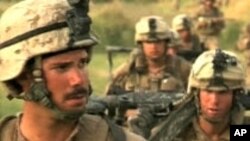As the Obama administration considers its future course in Afghanistan, public opinion in the United States remains split on the U.S. role there and on the question of sending additional U.S. troops.
Two recent public opinion polls offer a complex view of how Americans see the conflict in Afghanistan.
A recent survey by USA Today and the Gallup organization found that 48 percent favor sending more troops to Afghanistan, while 45 percent oppose.
There were similar findings in a recent poll conducted by Quinnipiac University in Connecticut, says pollster Peter Brown.
"What is clear from the poll data is that Americans are very ambivalent about what is going on in Afghanistan," said Brown. "A bare majority of Americans, 52 percent, think that the American military commitment there is the right thing to do. But a majority don't think it is going to work in terms of being able to stop terrorists there from using Afghanistan as a terrorist base to do terrorists acts against the United States."
Brown also says 55 percent in his poll trust the president to make the right decision on Afghanistan, while 81 percent have trust in military leaders to make the right recommendations on troop levels.
"Obviously there is a bit of a spread between those two figures and it suggests the possibility of some political problems for the president if he should not take the military recommendation and that difference gets to be a big issue," he said.
If the president decides to go with the higher troop levels recommended by the military, he will get support from congressional Republicans.
This is the House Republican leader, Congressman John Boehner of Ohio.
"And clearly the goal that the president laid out back in March that we should deny al-Qaida and the Taliban safe haven in Afghanistan continues to be the goal," said Boehner. "And if that is the goal, I believe that my [Republican] colleagues on the House side will be there to support him."
But any decision to send more troops will likely spark resistance from some congressional Democrats who oppose a build-up in Afghanistan.
The Democratic House Speaker, Nancy Pelosi, is taking a wait and see attitude on the policy review.
"The president has taken a very deliberative approach to this very difficult decision that he has to make," said Pelosi. "When we see what the president's suggestion is, what his plan is, then we will respond to that."
Pollster Peter Brown says the Afghan War has upended some typical political alliances in Washington.
"The people who are generally President Obama's supporters are the least supportive of the U.S. military presence in Afghanistan, mostly Democrats and self-described liberals," said Brown. "And the people who are normally the president's strongest opponents, conservatives and Republicans, are the biggest supporters of the U.S. military effort in Afghanistan."
Some experts see parallels between the Afghan strategy debate and the escalation of U.S. involvement in the Vietnam War in the 1960s.
This is presidential historian and author Robert Dallek:
"Once the public turns against a war, once it is convinced that you are embarked upon if not a losing enterprise then something that is going to produce a quagmire, it creates tremendous political difficulties for the president and it undermines his credibility, trust in his judgment and his ability to put across his domestic reforms," said Dallek.
Political analysts say Mr. Obama's decision on whether to send more U.S. troops to Afghanistan is likely to be a turning point in his presidency.
But presidential spokesman Robert Gibbs says what is at stake goes beyond just the president.
"This not a test for one person, this is not a test for one entity," said Gibbs. "This is a test for our country to adequately address and correctly address the extremist threat that emanates from Afghanistan and Pakistan. It is one the president takes seriously, and one the president is going to use his time to get right."




